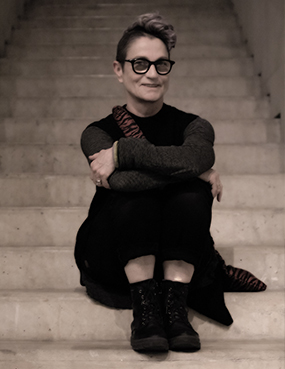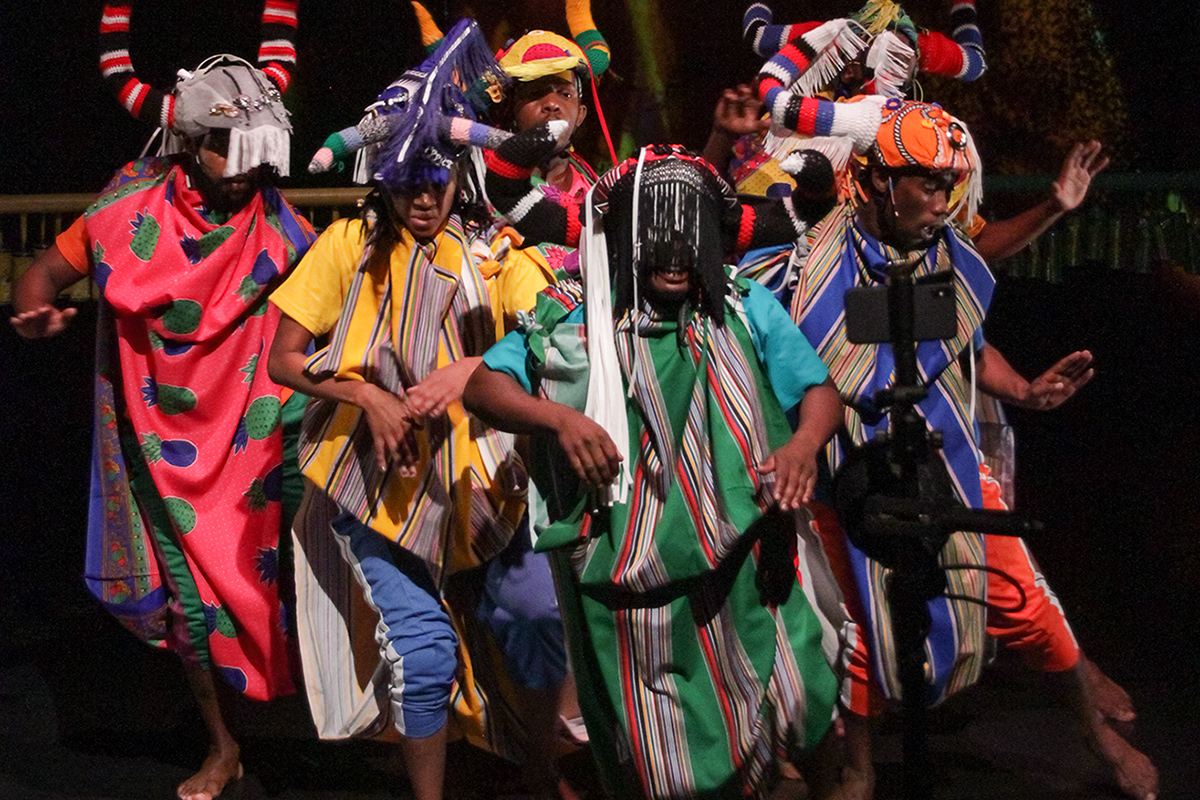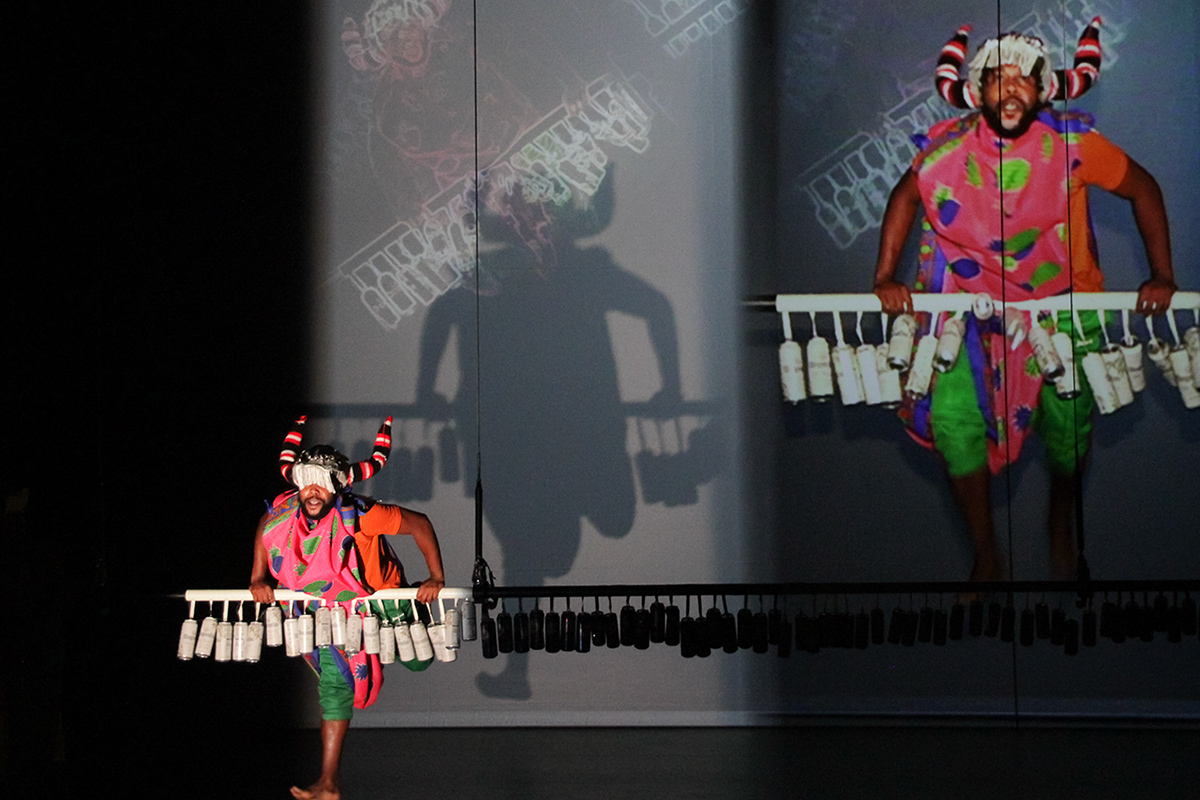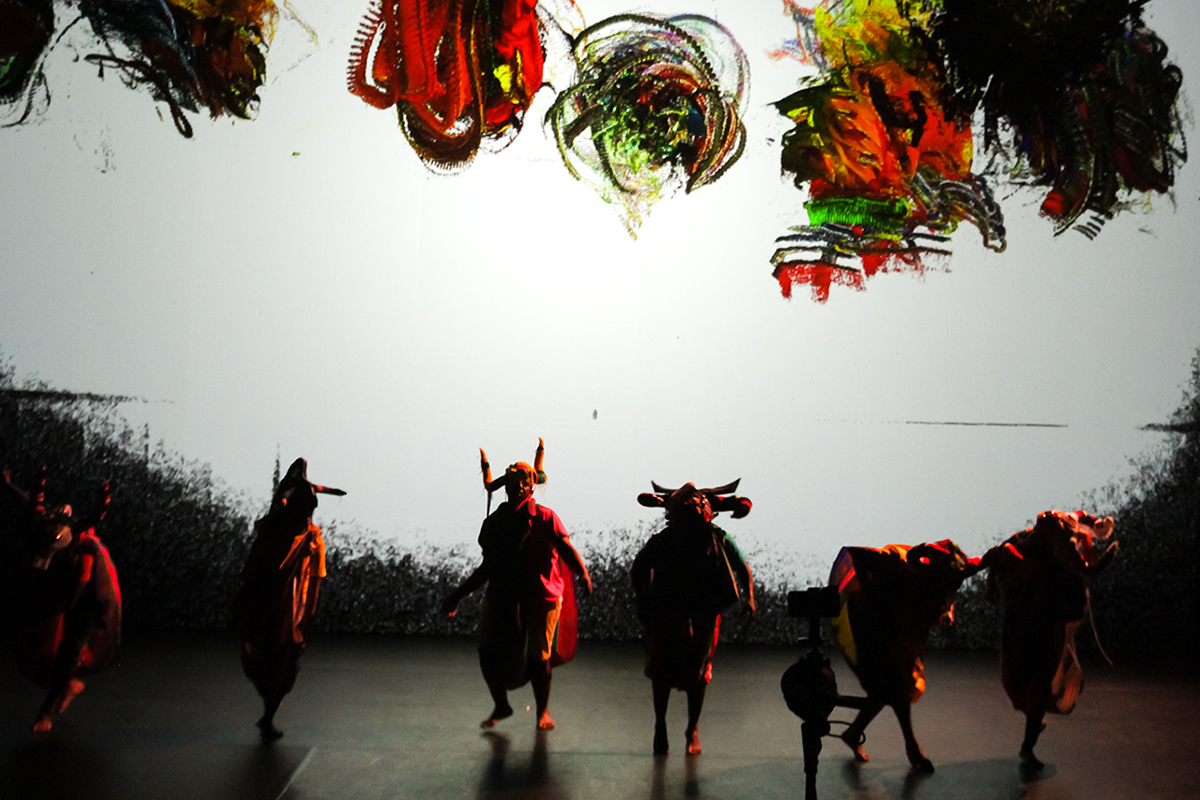Dance Reflections by Van Cleef & Arpels
we wear our wheels with pride and slap your streets with color… we said ‘bonjour’ to satan in 1820 …
Robyn Orlin
© Jérôme Séron
- Director Robyn Orlin
- Genre Dance
- Date 10.25.Sat. 7pm 10.26.Sun. 3pm
- Conversation with Artists 10.25.SAT.
Staging South African artistic resistance beyond history and oppression
Introduction<we wear our wheels with pride and slap your streets with color… we said ‘bonjour’ to satan in 1820 …> takes its motif from images of Zulu men pulling small rickshaws in the streets of Durban transporting white people under apartheid in the 1970s.
Robyn Orlin was deeply impressed by the pride and gestures of resistance expressed through their costumes, adorned with feathers, pearls, jewels, and cow horns. She recalls that they “seemed to dance, the body floating in the air,” and says that their movements came across not as labor for survival, but as an artistic act subverting dehumanization.
This period also coincided with the creation of Moving into Dance Mophatong (hereafter MIDM), a company nourished by Zulu traditions and a flagship for contemporary dance in South Africa.
<We Wear Our Wheels with Pride> features “rickshaw dance,” which was created by Robyn Orlin. Dancers express their thirst for the joy of life and their spirit of unyielding resistance against any oppression through dance and song. Anelisa Stuurman (Annalyzer)’s vocals and Yogin Sullaphen’s music add emotional depth to the work, blending slam poetry with both traditional and contemporary Khoisan music.
In this production, Robyn Orlin collaborates with eight young dancers to commemorate Black history in an artistic return to a common source. She passes down the memory of the past to the younger generation through art, continuing the struggle for dignity and equality.
<We Wear Our Wheels with Pride> is a tribute to the rickshaw drivers of South Africa and an homage to the unyielding creativity and dignity that endures even under oppression. It is also a celebration of South Africa's cultural identity.

Robyn Orlin
Born in Johannesburg in 1955, Robyn Orlin is an artist who has earned the nickname “a permanent irritation” for her sharp, unapologetic reflections on her country’s complex reality. She has built a unique artistic language through theatrical choreography that combines various media including text, video, and plastic arts. Her work invariably addresses political and social questions. One of her most prominent works, <Daddy, I’ve Seen This Piece Six Times Before and I Still Don’t Know Why They’re Hurting Each Other (1999)>, won the Laurence Olivier Award for Best New Dance Production, and <Beauty Remained for Just a Moment then Returned Gently to Her Starting Position> gained attention when it was selected as the opening performance for the 2013 France–South Africa Cultural Season. In 2004, she directed her first film <Hidden beauties, Dirty histories>, co-produced with INA and ARTE. In April 2018, she staged Rameau’s opera <Pygmalion> at the Dijon Opera as resident director, working alongside conductor Emmanuelle Haïm. She received the French National Order of Merit (Chevalier de l’Ordre National du Mérite) in 2009 and the Order of Arts and Letters (Chevalier dans l’Ordre des Arts et des Lettres) in 2015 in recognition of her international artistic achievements.
- A piece by Robyn Orlin
- With Moving Into Dance Mophatong Dancers Sunnyboy Motau, Oscar Buthelezi, Eugene Mashiane, Lesego Dihemo, Sbusiso Gumede and Masego Moloto
- Video Eric Perroys
- Costume Birgit Neppl
- Lights Romain de Lagarde
- Original music Yogin Sullaphen et Anelisa Stuurman
- Tour Manager Thabo Pule
- Stage Manager Jean-Marc L’Hostis
- Production City Theater & Dance Group, MIDM - Moving into Dance Mophatong and Damien Valette Prod
- Co-production Festival Montpellier Danse, Tanz im August – 32. Internationales Festival Berlin, Chaillot – Théâtre National de la Danse, Le Grand T- Théâtre de Loire-Atlantique, Charleroi Danse - Centre chorégraphique de Wallonie – Bruxelles, Théâtre Garonne – Scène européenne, Château-Rouge – scène conventionnée d’Annemasse
- With support from DRAC Ile-de-France
- Administration, booking Damien Valette Coordination Louise Bailly





